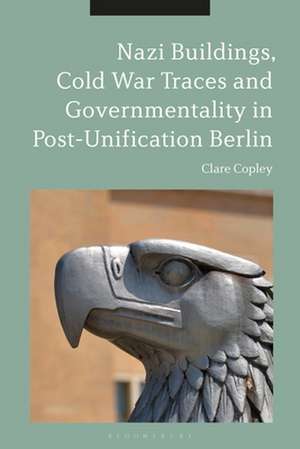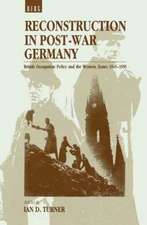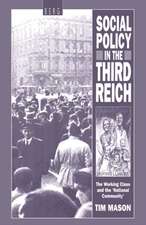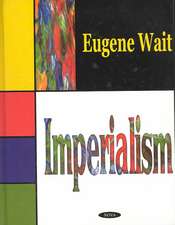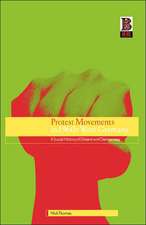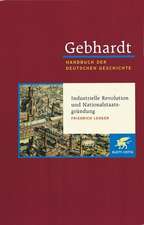Nazi Buildings, Cold War Traces and Governmentality in Post-Unification Berlin
Autor Dr Clare Copleyen Limba Engleză Hardback – 24 iun 2020
| Toate formatele și edițiile | Preț | Express |
|---|---|---|
| Paperback (1) | 198.40 lei 6-8 săpt. | |
| Bloomsbury Publishing – 29 dec 2021 | 198.40 lei 6-8 săpt. | |
| Hardback (1) | 598.84 lei 6-8 săpt. | |
| Bloomsbury Publishing – 24 iun 2020 | 598.84 lei 6-8 săpt. |
Preț: 598.84 lei
Preț vechi: 764.60 lei
-22% Nou
Puncte Express: 898
Preț estimativ în valută:
114.59€ • 119.94$ • 95.37£
114.59€ • 119.94$ • 95.37£
Carte tipărită la comandă
Livrare economică 31 martie-14 aprilie
Preluare comenzi: 021 569.72.76
Specificații
ISBN-13: 9781350081536
ISBN-10: 1350081531
Pagini: 264
Ilustrații: 29 bw illus
Dimensiuni: 156 x 234 x 23 mm
Greutate: 0.54 kg
Editura: Bloomsbury Publishing
Colecția Bloomsbury Academic
Locul publicării:London, United Kingdom
ISBN-10: 1350081531
Pagini: 264
Ilustrații: 29 bw illus
Dimensiuni: 156 x 234 x 23 mm
Greutate: 0.54 kg
Editura: Bloomsbury Publishing
Colecția Bloomsbury Academic
Locul publicării:London, United Kingdom
Caracteristici
Develops conceptions of governmentality by exploring it in a temporal, political and geographical context that demands a rethinking of the concept
Notă biografică
Clare Copley is Lecturer in Modern European History at the University of Central Lancashire, UK.
Cuprins
List of IllustrationsAcknowledgementsIntroductionPart I. Theoretical Approach1. Governmentality and the Politics of the Past2. Difficult Heritage in Berlin and Beyond Part II. Plurality? Performing Post-Authoritarian Governmentality at the Former Aviation MinistryIntroduction to Part II3. Reflecting National Socialism and the GDR in the 'Mirror of German History'4. Commemorating Opposition to Nazism and to the GDR: Harro Schultze-Boysen and 17 June 19535. Negotiating (In)Accessibility at a Democratic Government BuildingPart III. Rationality? Negotiating Post-Authoritarian Governmentality at the Olympic StadiumIntroduction to Part III6. Responding to 'The Racist Cult of the Body Manifested in Stone': The Olympic Stadium's Sculpture Collection7. Disentangling the Olympic Stadium's Layers: The History Trail8. (En)Countering the Cult of the Dead: The Langemarck Hall MemorialPart IV. Freedom? Transcending Post-Authoritarian Governmentality at the Former Tempelhof AirportIntroduction to Part IV9. Closing Tempelhof Airport, Berlin's 'Gateway to the World'10. The Columbia-Haus Concentration Camp and Forced Labourer Barracks: Exposing Tempelhof's 'Other' Pasts11. Contesting Freedom: The Proposed Development of the Heterotopia of Tempelhofer FeldConclusionBibliographyIndex
Recenzii
An exquisite blend of history, cultural geography and politics, this book takes the study of memory traces in the contemporary urban environment to a new level.
Exploring how modern Germans looks at, and argue about, three iconic Nazi buildings in their capital city, this study is both subtle and theoretically sophisticated.
Nazi Buildings, Cold War Traces, and Governmentality is a richly layered exploration of government practices, urban space, and the politics of memory in post-reunification Berlin. Copley expertly shows how a preoccupation with practicing liberal democratic values infuse Berliners' debates about how to preserve and memorialize Nazi monumentalist architecture and constitute a specifically post-authoritarian governmentality.
Exploring how modern Germans looks at, and argue about, three iconic Nazi buildings in their capital city, this study is both subtle and theoretically sophisticated.
Nazi Buildings, Cold War Traces, and Governmentality is a richly layered exploration of government practices, urban space, and the politics of memory in post-reunification Berlin. Copley expertly shows how a preoccupation with practicing liberal democratic values infuse Berliners' debates about how to preserve and memorialize Nazi monumentalist architecture and constitute a specifically post-authoritarian governmentality.
